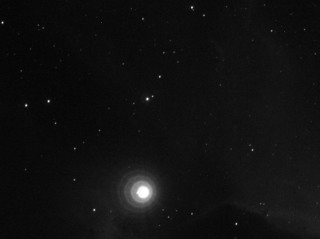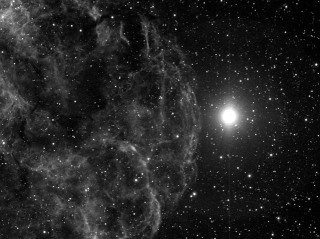Our emission line filters H-alpha, OIII, H-beta and SII for CCD astrophotography can be affected by halos if they were from batches produced between January 2007 and June 2008.
If you see halos around bright stars in your images, there are a number of possible reasons for this and the filter is only one possible contributor.
In recent years very fast optical systems have become popular for imaging. The energy in a filter induced halo grows exponentially as the f-ratio decreases. Additional to this, the smaller the FWHM band pass of the filter, the stronger the halo. The main reason for seeing these halos is the use of less than optimal coatings on optical surfaces in your imaging train. Usually every surface gets an anti-reflection coating, but you can do this with low cost or with high cost coating methods. Any cheaper and/or inferior coating on an optical surface, particularly close to the imaging plane, will likely cause strong halos. These effects become more likely and more prominent when you use any secondary optic like a field-flattener, reducer or coma corrector. When imaging with SLR lenses you might discover halos with one lens and no halos with another, even when they are from the same manufacturer.
What has Astronomik done to solve this?
Over the past year or more Astronomik has put significant effort into researching this topic. Our goal was to reduce halos caused by any of our filters to a level were it would not noticeably affect imaging. By making a number of modifications in the coating of our filters we were finally able to reach this goal. As a result of this effort we are confident that images taken with any Astronomik filter currently shipping will show no halos.While the halo effect was most noticeable in narrow band filters, during our filter development and improvement process we also improved our LRGB filter range. There were very few customers reporting problems with our LRGB filters and most of these were imaging at a very high level. Never the less, Astronomik saw some potential here and have taken the opportunity and made our popular LRGB series of filters halo free too!
Here you will see a comparison image with an old and a new filter:

defect filter, showing a halo around bright stars |

new halo-free filter |
Important:
No technical detail (like FWHM, peak transmission, glass thickness etc.) was changed!
As mentioned above, the filter MIGHT be the reason for halos, with an image and some technical details we are able to analyse the halos by running a short simulation.
If you are seeing halos around bright stars in your image, please follow the procedure described below. If the filters turn out to be the source of the halo, you will receive a replacement filter free of charge.
To do our analysis we do need the following data from you:
- an image that shows halos
(Full frame and full resolution monochrome image (no cropping, no reduction in size); dark- and flat corrected (if possible), no further processing!! Please submit as 16bit TIFF, uncompressed 16bit or 32bit integer FITS or RAW file from your camera.) - Which instrument was used?
(Diameter and focal length, type, any secondary optics (reducer, corrector etc..)) - Which camera was used?
(Type, size of chip and pixel, number of pixels per axis, manufacturer.) - Which filter was used?
- Serial number and size of filter
- Date of purchase and purchase reciept (if possible)
- Your full address
Free filter Replacement:
If the filters turn out to be the source of the halo, you will receive a replacement filter free of charge from our current production.
A final word:
We are confident that Astronomik filters are the best commercially available astronomical filters in the World today. We place extremely high importance on our quality control procedures, research and development. Due to this we are pleased to offer a warranty of 10 years on all of our filters.
At Astronomik we pride ourselves on continued improvement and refinement of our products. Astronomik offer a full replacement service for any filters identified to have any deficiencies for a period of 10 years!

 Deutsch
Deutsch English
English

